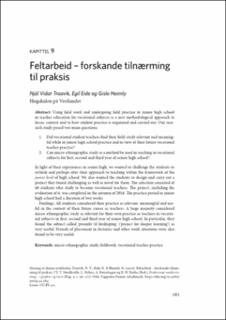Feltarbeid – forskande tilnærming til praksis
Chapter
Published version
Permanent lenke
https://hdl.handle.net/11250/2721775Utgivelsesdato
2020Metadata
Vis full innførselSamlinger
Originalversjon
Traavik, N. V., Eide, E., & Heimly, G. (2020). Feltarbeid – forskande tilnærming til praksis. I Y. Nordkvelle, L. Nyhus, A. Røisehagen, & R. H. Røthe (Red.), Praksisnær undervisning – i praksis og teori (s. 161–177). Cappelen Damm Akademisk. 10.23865/noasp.94.ch9Sammendrag
Using field work and undergoing field practice in junior high school in teacher education for vocational subjects is a new methodological approach to focus, content and to how student practice is organized and carried out. Our research study posed two main questions:
1. Did vocational student teachers find their field-study relevant and meaningful while in junior high school practice and in view of their future vocational teacher practice?
2. Can micro-ethnographic study as a method be used in teaching in vocational subjects for first, second and third year of senior high school?
In light of their experiences in senior high, we wanted to challenge the students to rethink and perhaps alter their approach to teaching within the framework of the junior level of high school. We also wanted the students to design and carry out a project they found challenging as well as novel for them. The selection consisted of 60 students who study to become vocational teachers. The project, including the evaluation of it, was completed in the autumn of 2016. The practice period in junior high school had a duration of two weeks.
Findings: All students considered their practice as relevant, meaningful and useful in the context of their future career as teachers. A large majority considered micro-ethnographic study as relevant for their own practice as teachers in vocational subjects in first, second and third year of senior high school. In particular, they found the subject called ‘prosjekt til fordjuping’ (‘project for deeper learning’) as very useful. Periods of placement in factories and other work situations were also found to be very useful.

